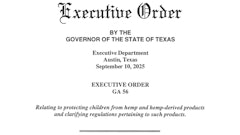Washington, DC - PRESS RELEASE: Today, Congresswoman Barbara Lee introduced The RESPECT Resolution, Realizing Equitable & Sustainable Participation in Emerging Cannabis Trades, to elevate the importance of building pathways of opportunity for individuals who have been most adversely impacted by the war on marijuana consumers.
Justin Strekal, NORML political director, said, “As more and more states dial back the war on marijuana consumers, it is important that those who were impacted by this oppressive criminalization are able to see previous harms remedied and be provided the opportunity to participate in the benefits that come along with legalization and regulation.
“It is absolutely crucial that future legalization efforts include avenues to expunge prior criminal convictions for actions which are now 100% legal. We sincerely appreciate Congresswoman Lee’s vision to facilitate those expungements at no cost to the individual. Currently, a complicated bureaucracy and unnecessary fees often prevent drug war victims from obtaining expungements and being able to fully participate in many aspects of civil society,”
On the industry implications of the RESPECT Resolution, Strekal said, "By preventing arbitrary business license caps, a broader and more diverse pool of entrepreneurs will be able to enter a freer marketplace and have a race to the top competition in the development of goods and services to best serve their consumers.
“By creating an equity permitting program to assist those who have been most adversely affected by the War on Drugs, it will create pathways to prosperity for those who, for too long, have been discriminated against for having a criminal record or even for simply living in an over-policed community.”
Congresswoman Barbara Lee said, upon introduction, “There’s no question that there is growing momentum–-both within Congress and nationwide-–for cannabis legalization. However, as we move into this new era, we must learn from the failed War on Drugs and ensure that entrepreneurs of color are included in this expanding industry. Due to unequal criminalization rates and disparities in access to capital, people of color are being locked out of the new and thriving legal cannabis trade,” said Congresswoman Lee. “We need to address the systemic exclusion and discrimination at play. Otherwise, we will be prolonging and encouraging the injustices of the past-–where brown men spend their lives in prison for cannabis, while white communities get rich off the industry. I encourage my colleagues to support the RESPECT Resolution, the first bill in Congress focused on building equity in the cannabis industry.”
Background
The “RESPECT Resolution: Realizing Equitable & Sustainable Participation in Emerging Cannabis Trades” elevates the importance of equity within the legal cannabis marketplace. This resolution aims to address disparities and proactively addressing and repairing the most egregious effects of the War on Drugs on communities of color. The RESPECT Resolution seeks both economic and reparative justice, ensuring that disenfranchised communities will be able to benefit equally in the emerging legal and regulated industry.
Summary
The “RESPECT Resolution” encourages States and localities to adopt best practices already in effect in localities around the country and take bold steps to address, reverse, and repair the most egregious effects of the War on Drugs on communities of color, in particular to those who maintain criminal records for a substance that is now legal and regulated.
Steps Encouraged by Resolution:
- Establish licensing and application fees that are reasonable to cover only the costs of program implementation and necessary regulations
- Create a system where licensing is to be obtained at the local level and avoids arbitrary caps on licenses, which allows the community to determine the type and number of licenses and results in an industry more representative of the local marketplace
- Eliminate broad felony restrictions for licensing and instead focus restrictions on entering the market to those with criminal convictions that are relevant to the owning and operating of a business to be made on a case-by-case basis
- Establish a free and automatic process for the expungement and resentencing of penalties for persons previously convicted of cannabis-related crimes for which the criminal penalties have been reduced or removed
- Eliminate the penalizations for persons currently under parole, probation or other state supervision, or released on bail awaiting trial, for conduct otherwise allowed under state cannabis laws
- Combat the vestiges of the War on Drugs by utilizing tax revenue for small business and community reinvestment



























